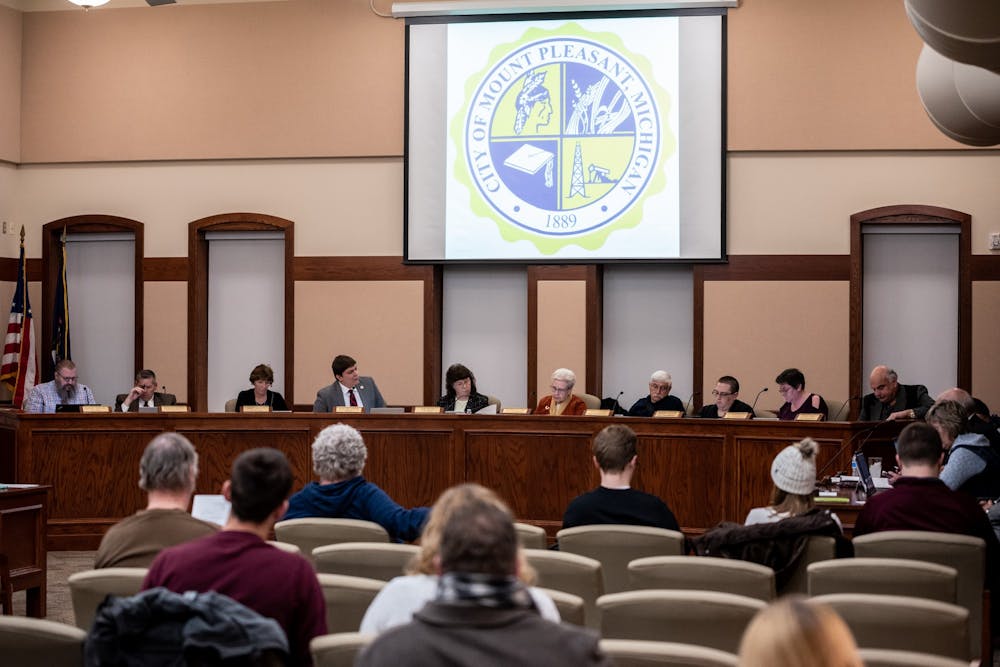Commissioners approve contaminant testing by Chippewa River, marijuana application fee
Mount Pleasant City Commission approved new wells for testing groundwater in a former landfill area by the Chippewa River during its Nov. 11 meeting.
Commissioners touched on many topics with the city, including marijuana regulations, the 2020 operating budget and referring a review of the zoning ordinance to planning commission. There was a back-and-forth discussion among commissioners about groundwater testing on the north side of town.
Groundwater testing
Earlier this year, pipes discharging contaminated water into the Chippewa River was discovered on a property that used to be a landfill. The pipes were capped off, but Director of Public Works John Zang said the city has additional concerns about the possible movement of contaminants from the landfill into the surface water of the river. These potential contaminants include ammonia, nitrate, selenium and Polyfluoroalkyl.
City Manager Nancy Ridley said AKT Peerless, an environmental consultant, and the Michigan Department of Environment, Great Lakes and Energy (EGLE) are recommending the city install new monitor wells in the area to test for contaminants.
AKT proposed four wells drilled in the former landfill area itself, which would go through the clay cap, but are not expected to go through the clay lining if found, Ridley said. There will also be 10 monitor wells outside the landfill area to test for contaminants along the riverbank. Ridley said the project would not exceed $30,000.
If the tests do indicate that contaminants migrated outside the landfill and into the groundwater to the river, the city may have to do additional remediation to protect the surface water in the river, Ridley said.
The commission tried approving the monitoring wells in the previous meeting but postponed it to this week’s meeting because some of the commissioners had questions and concerns that they wanted addressed by AKT and EGLE.
While both organizations said they are not experts in the field, Commissioner Tony Kulick said he’s always found AKT to be honest and straightforward and wouldn’t suggest tests for no reason. Commissioner Kathy Ling said the city should know where the contaminants are coming from because it’s important to follow up on if the contaminants are migrating to the river.
“At this point, there’s no reason to be overly concerned, but I think we need to give ourselves and residents assurance that we don’t need to be concerned about it,” Ling said. “I think we’re following regulations by doing it and I have confidence in (AKT) because of work they’ve done with us before.”
Both Ling and Ridley said drilling these new wells will save money because the testing done in the wells will narrow down the amount of chemicals they would need to test for on the riverbank.
But commissioner Petro Tolas, who has 40 years of experience in the oil and gas industry, voiced many concerns during the past two meetings. He said there are already four galvanized wells in the landfill area and two plastic wells outside, so it doesn’t make sense for the city to spend $30,000 for testing and creating new wells when it can spend under $3,000 using the old ones.
He said drilling holes into the clay lining could open a can of worms. It could lead to the city spending more than $50 million cleaning up the mess by either removing the landfill or building a slurry wall along the river with pumping and filtration, Tolas said.
“I’m beating my head against the wall and nobody is listening,” Tolas said. “When it turns out to be a $40 million or $50 million cleanup, whoever voted for it can be liable for it.”
During a public comment section, Wendy Robertson, who has 15 years of groundwater consulting experience, said the old wells currently in place on the former landfill site are galvanized steel wells, which might give out false positives for contaminants. Zang said galvanized steel is corrosive, which might get into the water.
Robertson also said the placement of the wells might not account for of the directional groundwater flow, so the tests might not be accurate. And the bentonite seals in the clay lining by AKT would address more contaminants leaching into the aquifer below, she said.
But Tolas said it’s impossible for AKT to guarantee there won’t be any further problems with the landfill area. The false positives from the galvanized wells might have high levels of zinc or iron, but there are no hazardous contaminants that he could see because test results from the plastic wells weren’t given to the commissioners before the vote was made, Tolas said.
The commission approved a contract with AKT for environmental consulting services. The proposal passed with a 5-2 vote, with commissioners Tolas and Vice Mayor Lori Gillis casting the dissenting votes.
Marijuana fees
The city also approved some rules for recreational marijuana. Commissioners approved a $200 application fee for recreational marijuana businesses. City ordinance allows for three recreational marijuana retailers. If a business submits its application after three have already applied, it would receive a $1,000 fee.
The city will begin accepting applications on Jan. 6.
Ridley said this was done to keep the recreational marijuana ordinance as similar to the medical marijuana ordinance as possible. Medical marijuana businesses also paid a $200 application fee.
Kulick said he anticipates many applications for this process.
“I envision (the city) in early January getting slammed big-time with hundreds or maybe 1,000 applications,” Kulick said.
Gillis introduced an amendment to the commission to lower the fee to $500 because the fee is too high for business entrepreneurs. The amendment failed 2-5, with Gillis and Tolas voting in favor. These two were also the dissenting vote when the $1,000 fee passed with a 5-2 vote.
Other business
- Commissioners approved the Mount Pleasant Planning Commission to review the city’s zoning ordinance. Ridley said some of the key points for review requested by the Home Builders Association are parking lots, roof pitches and a review of the zoning ordinance every five years. Ridley said many of the requests made were recently discussed by city commission. It passed with a 5-2 vote; Kulick and Tolas voted against it.
- Central Michigan Life was recognized by the commission in a proclamation for its 100th anniversary. Many CM Life staff members were there to receive the proclamation from Mount Pleasant Mayor Will Joseph.








